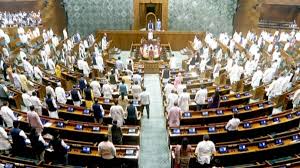Parliament Monsoon Session Day 1: Lok Sabha adjourned twice amid Oppn protests

New Delhi, July 21, 2025 — The Monsoon Session of Parliament opened with disruption on Monday. The Lok Sabha was adjourned twice after loud protests by the Opposition, which demanded an immediate debate on national security concerns. These included the Pahalgam terror attack and the Centre’s secretive Operation Sindoor.
The session, scheduled to run until August 21 with 21 working days, began on a tense note. The recess is planned for August 12 to 17.
Opposition Demands Debate on Terror Attack and Operation Sindoor
As the Lok Sabha convened, Opposition MPs from the INDIA bloc stood up and shouted slogans. They demanded a discussion under Rule 193 on the April 22 terror attack in Pahalgam and the classified Operation Sindoor in Kashmir. Many MPs displayed placards and raised slogans inside the well of the House.
Speaker Om Birla appealed for calm and promised time for everyone to speak. However, the protests continued. He first adjourned the session till noon and then again till 2 PM as the chaos did not subside.
Centre Urges Opposition to Follow Parliamentary Norms
Parliamentary Affairs Minister Kiren Rijiju said the government was willing to discuss all serious matters. But he stressed that debates must follow rules and procedure. “We respect every concern. But shouting in the well is not the way to go forward,” Rijiju said.
Defence Minister Rajnath Singh also spoke briefly. He said the government had already shared information about Operation Sindoor with senior leaders. “This operation is sensitive. We must act with national interest in mind,” he said.
Tributes to MPs and Victims of Tragedies
Before protests began, Speaker Birla led a tribute to eight former MPs who passed away recently. The House also mourned victims of the Air India Flight 613 crash in Ahmedabad on June 12. The crash killed 59 people, including airline crew members. Members also remembered the lives lost in the Pahalgam terror attack.
A moment of silence followed these tributes.
Parliament Pushes Through Limited Business
In brief moments of order, Parliament managed some business. BJP MP Baijayant Panda presented the Select Committee report on the Income-Tax Amendment Bill, 2025. The bill seeks to simplify the tax process and tighten anti-evasion rules.
The government also introduced the Bureau of Border Security Bill. This bill aims to create a specialized agency to tackle border infiltration and drug smuggling. However, protests disrupted the planned debate.
In contrast, the Rajya Sabha moved forward with its schedule. It began discussion on the Bills of Lading Bill, 2025, which addresses legal aspects of international trade shipping.
Both Sides Hold Pre-Session Strategy Meets
Ahead of the session, both camps met behind closed doors. Prime Minister Narendra Modi held a strategy meeting with senior ministers, including Amit Shah and JP Nadda. They discussed how to navigate the Opposition’s challenges and push key bills.
The Opposition alliance met earlier in the day. They agreed to corner the government on three major issues: the Pahalgam attack, lack of transparency in Operation Sindoor, and alleged irregularities in Bihar’s electoral roll revision, flagged by the SIR report.
More Fireworks Expected Ahead
The Monsoon Session promises heated debates and more confrontation. The government plans to introduce over 15 new bills. Among them are the Digital Surveillance Regulation Bill and the Broadcast Regulation Act. Civil society groups have raised concerns about both.
The Opposition says it will not allow smooth functioning until the government agrees to an urgent discussion on the Pahalgam attack.
With state elections approaching in Maharashtra, Haryana, and Jharkhand, both sides are using Parliament to shape public opinion.
Conclusion
Day one of the Monsoon Session revealed sharp political divides. The government moved forward with some legislation, but loud protests halted progress in the Lok Sabha. Opposition MPs made it clear—they want answers on national security issues, and they won’t back down easily.
The next few weeks may decide whether this session becomes a platform for real debate or another missed opportunity for governance.






